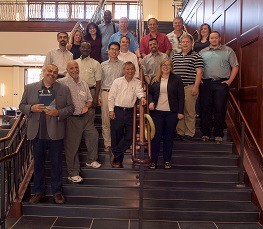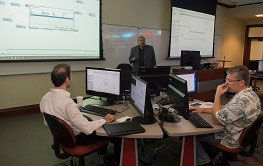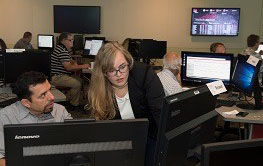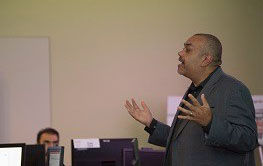Radford University
Analytics
The Center’s attentions demonstrate the positive contribution analytics can have in fact-based decision making while providing an opportunity for practical applications that enrich the research, teaching, and learning of students and faculty.
To continue enrichment, the Center offers workshops and seminars that help our students and faculty understand business analytics through cutting-edge information using various software solutions available. This provides students with the analytical skills employers are seeking.
The center will host:
- Regional Big Data Competition
- An Analytics Case Team Competition
The exchanging of ideas among companies, organizations, faculty, and students allows them to learn together and explore best practices in applying business analytics to structured and unstructured data to enhance business and organizational performance. The Center for Innovation and Analytics helps students learn lifelong skills and processes to turn ideas into action and data into information to optimize business decisions. Students, working individually or in teams, are able to focus on projects that support their innovation or analytic learning needs. Faculty and industry mentors work with students to coach, guide, and mentor them during the learning process to support Davis College student learning outcomes in analytics.
B.B.A.: Students are able to identify, apply, and interpret the results of analytical techniques to recommend action or guide decision making that improves business performance. This Center helps accomplish this by offering an assortment of experiential and active learning opportunities designed to aid students in obtaining and refining the creativity and innovation skills.
MBA: Students are able to apply and compare analytical techniques to find patterns within data and make predictions that will optimize managerial decisions. In addition to programs mentioned under the BBA, the Center also provides large, real-world datasets for our faculty, students, and other constituents to sharpen their skills in analyzing the complex relationships of a large number of factors that impact business performance.
Areas of Growth in Analytics
Drivers
There are many drivers creating an urgent need for analytics educated employees. The
drivers include: 1& 2& 3& 4& 5
- Big Data, both structured and unstructured, continues to grow exponentially
- The need to draw competitive insights out of a company’s data
- Analytics provides an opportunity to enable innovative ideas and new business models
- Continued advances in analytics software, algorithms, modeling, and visualization
- Advances in open source software and platforms such as R, Apache Hadoop
- Many existing employees are not skilled to cope with the complexities of Big Data
- Need for enhanced security, performance, and scalability
- A growing need for predictive models and employees who understand them.
- Need for employees with the ability to translate analysis to action
- The need to pull value from data that can lead to competitive differentiation
- The need for better dashboard tools, designed for business users and available on mobile devices
The reality that social media analytics is becoming an integral part of every business. There are four areas experiencing sustained growth in demand for analytics trained professional: Marketing Analytics, Financial Analytics, Healthcare Analytics, and HR/Talent Analytics.
Marketing Analytics
A few quotable quotes:
“Marketing organizations are better defining specific needs within ‘analytics’ and
getting more precise at searching for specific analytics-related skill sets, as opposed
to hiring someone with a general analytics background. For CMOs, this is further evidence
of the accelerating shift toward more – and more sophisticated – use of analytics
in marketing. And here again, organizations leading these advances will win.” 6
“There has been a significant increase in demand for both specialist skills and more general digital marketing roles across the board. When asked about the digital marketing jobs landscape, Jane Creaner Glen, Head of Recruitment and HR at the Digital Marketing Institute said, “I would say it is evolving all the time. A lot of companies are still looking for broad digital marketing skills at the Manager and Executive level. Although, as the industry matures it is separating out more into specific skills areas, such as Content, SEO/SEM, Analytics and Social Media.” 7
“The most nascent -- but arguably the most powerful -- marketing analytics tool is predictive modeling. Predictive modeling takes conventional data kept by marketers and CMOs, compiles it and crunches it to reveal patterns that confidently predict future buyer behavior. Predictive analytics allow marketers to more concretely assess what messages or content they should be creating in order to optimize their revenue potential.” 8
“As of our analysis date (July 2013), there were 23,118 job postings that included one or more of the requirements: marketing analytics, advanced analytics, marketing mix modeling, media mix modeling or digital attribution.” 9
Duke University’s Fuqua School of Business August 2014 CMO Survey10 identified two important trends for B2B marketers:11
– Digital marketing spending increased while non-digital marketing spending decreased
– Spending on marketing analytics is expected to increase 73% over the next three
years
“Big Data coming from social, mobile, search, web traffic and back-end processes and analytics applied to these data can deliver individualized, personalized digital experiences across all channels.”12 Investing in marketing analytics is important to secure the future of most companies. 13
Financial Analytics
A quotable quote:
“With the rise of analytics, in many organizations Finance is expanding its role and
providing increasing value in other functional areas. For many, Finance has become
the enabler of analytics and decision support. The reasons are simple: Finance data
is rapidly being deployed outside its traditional scope. Further, as the economy evolves,
Finance is looking for ways to deliver greater value as a business function, as it
often overlaps with analytics in other business areas. Finance also has an ability
to apply analytics above and beyond traditional delivery channels.” 14
The financial services may have been slower to adopt social media and feel the full force of Big Data and digital technologies15, but demand is growing rapidly for professionals with an understanding of financial analytics.16 “More CFOs are relying on analytics to create market differentiation and to identify new sources of revenue.”17 They are recognizing and taking advantage of three key benefits: real-time data access, visualization, and the ability to analyze massive amounts of data.18
According to the senior managing director of Accenture’s Financial Services group in North America, there is a skills shortage among trained analytics talent from fund managers to investment bankers.19
Data is core to businesses in financial services. Many top business schools run financial analytics specializations within their MBA programs, which look at areas such as data mining, predictive modeling, and fixed income asset pricing. An Analytic Finance concentration is within the MBA program at Chicago’s Booth School of Business, and the MBA at NYU’s Stern School of Business offers the Financial Systems and Analytics track. In the UK, Swansea University offers a dedicated MSc Business Analytics and Finance degree, and the University of Southampton offers an MSc Business Analytics and Finance program. 20
Healthcare Analytics
“Financial analytics holds the largest share among the healthcare analytics market
and tends to be one of the strongest emerging applications in healthcare analytics.”21
Rapid advancements in technology and increasing data complexity are two of the major
drivers for the rapid growth in financial healthcare analytics. The functional gap
between payers and providers and the high cost of adopting healthcare financial analytics
will challenge the growth in this market sector. The healthcare financial analytics
market is segmented into three types: claims analytics, revenue management analytics
& risk management analytics. The healthcare financial analytics is also characterized
by end-users segments including healthcare, pharmaceuticals, biotechnology, and higher
education. By region, the healthcare analytics market is segmented into four major
areas: North America, Europe, Asia-Pacific and all other areas grouped together.22
HR/Talent Analytics
According to a Deloitte study, “Talent Analytics presents the second largest capability
gap for organizations, trailing only the need to build better leadership. Three in
four companies (75 percent) believe that using analytics in HR is “important,” but
just 8 percent believe their organization is “strong” in this area.”23 The survey
concludes that most HR organizations have been slow to get started.
HR Management has been slow or reluctant to dedicate analytics staff with the responsibility to gather, analyze, and interpret data. For HR departments to fully utilize Talent Analytics staff with new and different skill sets will be required. While the number of job postings slowed in 2014, the demand for HR analytics professionals remains strong. “Part of the reason for the slowing growth in HR analytics job postings may be the difficulty in finding people to fill these roles. Due to high demand for analytics skill sets over the past few years, it is taking longer to fill these types of positions – and becoming more expensive.”24
Analytics Career Preparation
Microsoft Office Specialist Certifications
The Center for Innovation & Analytics offers students, faculty, staff, and alumni the ability to achieve Microsoft Office Specialist (MOS) Certification in:
- Access Expert
- Powerpoint
- Excel
- Word
- Excel Expert
- Word Expert
- Outlook
Preparing for the Exam
The Microsoft Office Specialist (MOS) 2019 exams use a project format. Each exam typically consists of 6 - 7 projects and each project has approximately 4 to 7 questions. Each MOS certification exam covers specific topics and you should review the topics covered by the exam as an important part of your preparation. These include: Access Expert 2019, Excel 2019, Excel Expert 2019, Outlook 2019, Powerpoint 2019, Word 2019, Word Expert 2019.
The Center for Innovation and Analytics (CIA) also has a university site license for GMetrix. This is software that was specifically designed to help prepare you for the MOS certifications. You are strongly encouraged to use this software prior to taking an exam. GMetrix is available in the DCOBE Trading Room and computer labs across campus. It can also be downloaded to your computer if you have a machine that runs Windows and Office 2019 (it does not work on a Mac). For more information and to receive your GMetrix code, contact the Division of Analytics of the CIA at cia-analytics@radford.edu. If you are in a course requiring a MOS certification, you will receive your GMetrix code from your professor.
Scheduling a Time to Take the Exam
For Students
Exams will be offered at various times throughout the semester. You should allocate a minimum of 1 hour for taking the exam (the actual exam is 50 minutes). You will need to reserve a time in advance. See
the email sent to your class for instructions for using the online reservation system in
order to reserve the day and time of your choice. The instructions also provide you
with information on how to change an existing reservation in the event you need to
do so.
For Faculty/Staff
Contact the Division of Analytics of the CIA at cia-analytics@radford.edu and we will work with you individually to schedule a time to take the exam.
Paying for the Exam
The cost for Radford University students, faculty and staff to take a Microsoft Office Specialist Certification exam is $75 (Radford University charges a reduced rate that is less than the price of paying through Certiport or taking it at other Certiport centers). If you are enrolled in ITEC 281, payment for taking the Microsoft Office Specialist Certification exam one time is included as a part of your course fee.
If you are (1) not enrolled in ITEC 281 or (2) in ITEC 281, do not pass the exam and wish to take it again, you will have to pay the exam fee as specified below.
Two forms of payment can be accepted: (1) cash (you must have exact amount – no change can be provided) or (2) personal check (made out to Radford University) – we do not have the ability to take credit cards as payment for certification exams. When you pay for the exam, you will be given a receipt. Please do not lose this receipt as the proctor cannot administer the exam without this proof of payment.
Payments must be made at the Center for Innovation and Analytics located in Kyle Hall Room 231 (the center is located near the front door of the building next to the Trading Room). The Center for Innovation and Analytics is open to receive your payment Monday through Friday between 10:30 a.m. and 3 p.m.
Do not purchase an online voucher from Certiport – anyone who purchases a voucher from Certiport will have to pay an
additional fee of $20 (either in cash or by check) in order to have the exam proctored.
Taking the Exam
Prior to taking the exam, you must create an account with Certiport. Please create a username and password you will remember as you will need to use this when you take the exam.
- Under Choose a Purpose select Microsoft Office Specialist.
- When the Microsoft Registration screen appears simply click on the Use my Certiport data button and you will not have to enter any additional information.
Please make sure you complete the registration in its entirety – not doing so will create a delay when you come in to take your exam.
All exams will be administered online (and proctored by a Davis College faculty member). You will receive an email the evening before your scheduled exam time with detailed information. Please click on the link emailed to you at the time scheduled. You will need to show the test proctor your (1) payment receipt (ITEC 281 students will not need a payment receipt for their first exam attempt) and (2) Radford University identification. You will not be able to take the exam if you do not have these with you.
When you come to take the exam, you may not have anything on the desk with you (this includes paper, pencil, cell phone, tablet, laptop, etc.) – anything you have with you must be put away during the exam. You are also not allowed to use headsets when taking the exam.
Once you start the exam, you will have 50 minutes to complete it. If you have not finished the exam when time expires, you will be graded on what you have completed. When you submit the exam, you will receive your grade immediately. You must earn a minimum score of 700 (out of 1000) to pass the exam and earn your certification. If you are taking the exam as part of a course, your instructor will be notified of your score by the Center for Innovation and Analytics.
Retaking an Exam
If you do not pass the exam, you may take the exam again. Please note that you must pay the $75 exam fee for each retake and you must register to schedule the exam. The following Microsoft policies also apply:
- If you do not pass on the first attempt, you must wait 24 hours before you can retake the exam a second time.
- If you do not pass the exam on the second (or subsequent) attempt, you must wait 48 hours before you can retake the exam.
- There is no annual limit on the number of exam retakes.
- If you achieve a passing score on the MOS exam, you are allowed to take it again.
Students with Center for Accessibility Services Accommodations
Certiport, the administrator of the MOS exams, does have a policy for accommodating students with a disability. Please note, however, that being classified as a CAS student at RU does not automatically grant you the same status with Certiport. Certiport has its own rules and procedures for this; they also will request specific documentation for review. For more information, visit the Certiport Accommodation of Disabilities site. Certiport requires a minimum of 2 weeks to review and process the forms so it is up to you to plan accordingly.
If you do receive accommodations from Certiport, please notify the CIA at cia-analytics@radford.edu when you register for the exam as the proctor needs to know this in advance. Not
providing advance notification may force you to reschedule the exam.
Make Yourself Even More Marketable to Employers
You can differentiate yourself, demonstrate true proficiency of the Microsoft Office suite and increase your marketability to future employers by earning either the Microsoft Office Specialist: Associate certification or the Microsoft Office Specialist: Expert certification.
To earn the Microsoft Office Specialist: Associate certification, you must pass the following exams:
- Excel 2019
- Outlook 2019
- PowerPoint 2019
- Word 2019
To earn the Microsoft Office Specialist: Expert certification, you must first earn the Microsoft Office Specialist: Associate certification and pass two of the following exams:
- Access Expert 2019
- Excel Expert 2019
- Word Expert 2019
Telling the World You're Certified
After you earn a Microsoft Office Certification, you can let the world know of your
achievement. You can claim your Microsoft Office Specialist badge that you can share
on LinkedIn, by email, or by sending a URL directly to future employers by creating
or accessing your account on Credly Acclaim at https://info.credly.com/acclaim. You can also log on to your Certiport account at https://certiport.pearsonvue.com and print your official certificate.
Questions or Assistance
If you have any questions or need assistance, contact Dr. Angela Stanton at astanton@radford.edu.
Executives in Residence in Analytics
Paul Hurlocker has been a Programmer, CTO, Chief Architect, and Consultant spanning numerous technology disciplines and industries over a 19 year career. For the last many years, he has been focused on evangelizing, designing, and implementing analytics and big data solutions, and distributed service-based systems. Paul is currently the CEO and Co-Founder of Notch (www.notch.io), a consulting firm that delivers solutions to customers by applying its expertise in strategy, machine learning, and data engineering.

Suneel Grover, MBA, MS (BBA in Marketing from the DCOBE at Radford University) Principal Solutions Architect - SAS / Professorial Lecturer - George Washington University - Sixteen years of experience in marketing (direct/indirect/integrated/omni), predictive analytics, data science, data mining, digital analytics, data visualization, business intelligence, data management, customer intelligence, segmentation, customer journey lifecycle management, digital personalization/optimization, competitive analysis and program/process management.
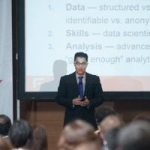
David Tomala, Senior Director of Advanced Analytics, Express Scripts. (Presently, Senior Manager – Content Analytics at Amazon). Tomala served as lead for Express Scripts Advanced Analytical efforts for research and development where he worked with corporate executives to set the analytical strategy for product research and development. He also established projects with business owners to support the analytical strategy. He manages a team of 12 data scientists.

Jeffrey Burkett (Radford University '93), VP of Advertising Innovation, USA Today Network. Jeffrey's job entails helping "manage the complexity of digital advertising and to define our unique story to the marketplace." He has also been an advertising executive for the Washington Post.

Success Stories
The DCOBE has assisted in the education of undergraduate and graduate students to pursue careers in analytics or to pursue additional analytics education. We are very proud of our DCOBE and Radford University graduates.
- Ian Burton, MBA, Operations Analyst at Unisys
- Kevin Carwile, MBA, Manager of Analytics, Research, and Insights at Charter Communications (formerly Time Warner Cable)
- Michael Dada, MBA, Analytics Consultant at Deloitte
- Juna Gjata, MBA Data Analyst at Bet Advisor
- Griffin Happel, MBA, Senior Analyst at Charter Communications (formerly Time Warner Cable)
- Jennifer Kelly, BBA, Portfolio Analytics at FactSet
- Brittany Little, MBA, Federal Infrastructure Consulting Analyst Senior at Accenture
- Christina Love, MBA, Marketing Specialist and Analyst at American Association for Physician Leadership
- Luke Marchetti, BBA, Business Analytics Consultant at MarketBridge
- Ashley Maxfield, MBA, Financial Planning and Analysis Manager at Genworth Financial
- Joe Mills, BBA/MBA, Business Analyst at WorldStrides
- Gracie Nelson, MBA, Senior Analyst at Novo Nordisk
- Igor Ogrizek, MBA, Marquardt Group, Information Technology and Services
- Sara Ponthieux, BBA, Implementation Specialist at Samanage, previously a Product Feed and Marketplaces Analyst at ROI Revolution, Inc.
- Hannah Steineke, Senior Research Analyst at Nielsen
- Ashley Tran, MBA, Analytics Analyst, Modeling and Segmentation, Charter Communications (formerly Time Warner Cable)
- John Tyreman, Research Specialist, Hinge
- Christopher Williams, MS, Analyst, People Analytics at Hilton World (Christopher was an industrial-organizational psychology student who had a great talent in analytics and successfully completed MKTG 630, Data Mining and Predictive Analytics)
- Layden Williams, MBA, Accounting Analyst at Met Life, prior job was A/R Specialist at Maersk Line
- James Woods, MBA, Baseball Analytics/Operations Intern at TrackMan Baseball
- Krzystof Nalborski, MBA, pursuing a MSc in Big Data and High Performance Computing at the University of Liverpool
Analytics Events
Radford University faculty and staff participated in a training workshop taught by two SAS instructors. Faculty and staff were able to learn new skills using the SAS Enterprise Miner software available on campus. More information is available in the article written by Chad Osborne.
SAS Joint Graduate Certificate in Business Analytics
The Graduate Certificate in Business Analytics provides the opportunity to acquire the skills, knowledge, and abilities required to enter the high demand analytics field. Jointly offered with SAS, a worldwide leader in data analytics software and the largest independent vendor in the business intelligence market, this certificate program allows students to differentiate themselves in the job market enabling them to bridge the gap between discipline specific knowledge and the ability to analyze relevant data for better-informed decision-making.
Eligibility
Post-baccalaureate students interested in obtaining an in-demand and valuable skill set without pursuing a full graduate degree.
Graduate and post-graduate students who are interested in achieving a competitive edge in the job market. This certificate program complements many existing degree programs at Radford University.
MBA students interested in the fast-growing area of analytics are able to obtain the SAS Joint Certificate in Business Analytics as an area of focus in their program. This certificate can be achieved within the 36 required hours for the program.
Certificate Curriculum Requirements
Students are required to take a total of 12 credits toward the completion of the certificate.
9 required core credits (3 courses - 3 credits per course)
- Business Analytics Foundations - MKTG 625
- Predictive Analytics & Data Mining - MKTG 630
- Financial Analytics: Applications for Data Analysis and Portfolio Construction - FINC 651
3 restricted elective credits (1 course - 3 credit hours - choose from one of the following)
- Quantitative Methods - MGNT 622
- Business Forecasting - ECON 694
View the syllabi for these courses.
Admissions Requirements
Students must have earned a bachelor’s degree with a minimum cumulative grade point average (GPA) of 2.75 to be able to apply for the certificate program.
Students who already hold a graduate degree must provide proof of degree completion when applying for the certificate program.
Current graduate students must be in good standing to apply for the certificate program.
All students must also have (1) English language proficiency and (2) demonstrated foundational knowledge in statistics (which can be met through equivalent coursework from an accredited university, successful completion of an online preparation course through the Radford University College of Business and Economics, or sufficient demonstration of knowledge through work experience).
For more information, contact Dr. Can Dogan at 540-831-6712 or radfordmba@radford.edu.
